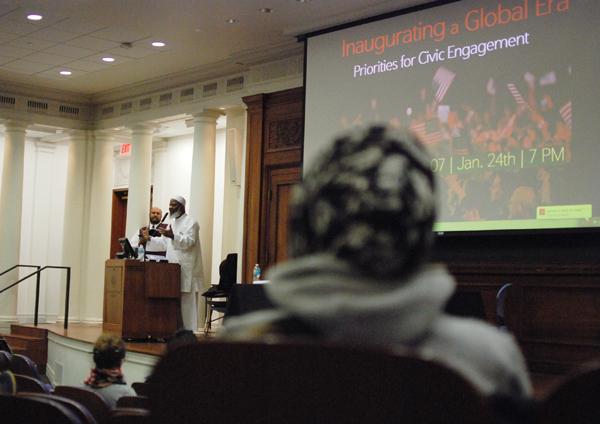
In the spirit of Monday’s presidential inauguration, the Muslim-cultural Student Association hosted a discussion about the importance of civic engagement.
Three panelists, including a Northwestern alumna, spoke about intertwining service with faith. About 80 people attended the two-hour discussion in Harris Hall.
“As Muslims and college students, we have the responsibility to contribute to society,” McSA Vice President Arshad Haque said.
The Weinberg junior started the event reciting from the Quran, followed by an English translation from another student. Each panelist spoke for roughly 20 minutes, quoting Dr. Martin Luther King Jr., the Quran and the Bible to discuss Americans’ obligation to change their communities and country.
Tamanna Salikuddin (WCAS ‘01), director for Afghanistan and Pakistan at the National Security Council, started the panel by discussing civil service, faith and post-graduate life.
She said NU students are blessed with a liberal arts education and should not waste such an opportunity.
“You can’t talk about civic engagement until you acknowledge all the blessings we have as Americans,” she said. “Societal obligations are part of your religious obligations.”
SESP senior Erica Martin said she appreciated that the message transcended one particular faith.
“I’m not Muslim, but they said a lot of things you could take away regardless of religion,” she said.
All three panelists spoke about students’ obligation to act immediately, instead of waiting for a future career or better time to change the world through small acts of kindness.
Panelist Omid Safi, a professor at University of North Carolina at Chapel Hill, said the beauty of faith traditions has been lost in a world dominated by America, often at the expense of the poor and under-served portions of society. America lost sight of its goals once its citizens elected Barack Obama in 2008, he said, and Monday’s inauguration was a reminder of the work that remains.
Safi later likened American hegemony to “Star Wars,” as the country faces little competition from other nations and does not always use its power for good.
“America has a soul, and its soul is sick,” he said.
But hope is not lost as long as students remain active, he added.
Panelist Imam Siraj Wahhaj, leader of the Muslim Alliance in North America, used many of Safi’s examples to demonstrate America’s brokenness, such as King’s still-relevant sermons. He urged students to avoid pushing their faith on others but rather to lead by example.
“If you want to change the world, you have to recognize that by nature human beings are imitators,” Wahhaj said.












